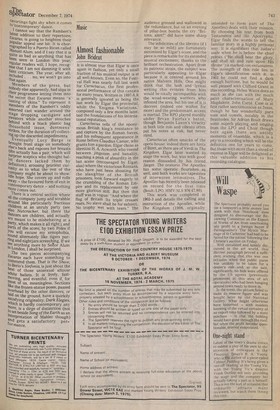Music
Almost fashionable
John Bridcut
It is almost true that Elgar is once again in fashion, yet only a small fraction of his musical output is at all well-known. Even so, the Festival Hall was nearly full last week for Caractacus, the first professional performance of this cantata for many years. Written in 1897-8, it is generally ignored as being the last work by Elgar the provincial, while the 'Enigma Variations,' composed only a few months later, laid the foundations of his international reputation.
Caractacus tells of the eponymous British king's resistance to and capture by the Roman forces, and his subsequent appearance in Rome before Claudius Caesar, who grants him a pardons Elgar chose as librettist H. A. Acworth who veered between jingoism and banality, reaching a peak of absurdity in the last scene (encouraged by Eiger, alas) where the victorious Romans, who have just been shouting for the slaughter of the British prisoners, look forward eagerly to the crumbling of the Roman Empire and its replacement by one more glorious still. But then this stuff was in vogue: "And where the flag of Britain Its triple crosses rears, No slave shall be for subject, No trophy wet with tears." The audience grinned and wallowed in the redundance, but on an evening of pillar-box bombs the cry "Britons, alert!" did have some sharp relevance.
The infelicities of the libretto (if I may be so mild) are fortunately minimised by Elgar's score, and the piece is remarkable for its extended musical excitement, thanks to the brilliant orchestration. Apart from its patriotic strain, the subject was particularly appealing to Elgar because it is centred around his native Malvern Hills. One might think that the lush and • lyrical writing this evinces from him would be totally incompatible with the woad-wearing warriors who infested the area, but his use of it is discreet (indeed one wishes for more) and the predominant accent is martial. The RPO played sturdily under Bryan Fairfax's baton, though Benjamin Luxon's vivacity in both title role and vibrato often put his notes at risk, but never mind.
Caractacus often smacks of the opera-house: indeed there are hints of Bizet, as there are of Verdi in The Kingdom. Elgar later wanted to stage the work, but was with good reason dissuaded by his friend Jaeger. The oratorio The Apostles has some operatic flourishes as well, and both works are tapestries of interwoven leitmotives. The Apostles has recently been released on record for the first time (Boult/LPO. HMVSLS 976 £7.80). This work was completed in 1902-3 and details the calling and instruction of the Apostles, while The Kingdom (1906, orginally intended to form part of The Apostles) deals with their mission. By choosing his text from both Testaments and the Apocrypha, Elgar finds the words to tell the familiar story in a highly personal way. It is significant that Judas's aside when he is before the chief priests ("He shall bear the glory, and shall sit and rule upon His throne") is marked con entusiasmo. The strength of this role lies in Elgar's identification with it; in 1903 he could not find a dark enough baritone, but he would be well pleased with Clifford Grant in this recording.. Helen Watts does as much as she can with the much paler characterisation of Mary Magdalene. John Carol Case. is at first rather sanctimonious as Jesus, though he has wonderfully pure tone and vowels, notably in the Beatitudes. Sir Adrian Boult draws some superb playing, and singing from the LPO and Choir though here again there are untidy moments of ensemble, which is a pity in a recording which will be the definitive one for years to come. But those with more than a shred of interest in Elgar will be delighted at this valuable addition to his recording catalogue.


































 Previous page
Previous page